Assessment 3: Law and Health - Bills, Social Media, and Regulations
VerifiedAdded on 2022/10/17
|9
|1378
|202
Homework Assignment
AI Summary
This assignment, completed for a Law and Management in Health course, examines two key areas: the process of law making and the role of social media within the healthcare sector. The first part analyzes two bills, focusing on citizen involvement, relevant institutions, and ministerial roles. It differentiates between state and federal bills and explores how consumer groups can influence legislation. The second part delves into the use of social media by Ambulance Victoria employees, outlining its relevance, applicable laws and regulations, and examples of potential breaches. It references the Victorian Public Sector Commission guidelines and other relevant acts to highlight expected standards and behaviors for healthcare professionals. The assignment underscores the importance of law in shaping health outcomes and professional conduct within the healthcare environment.
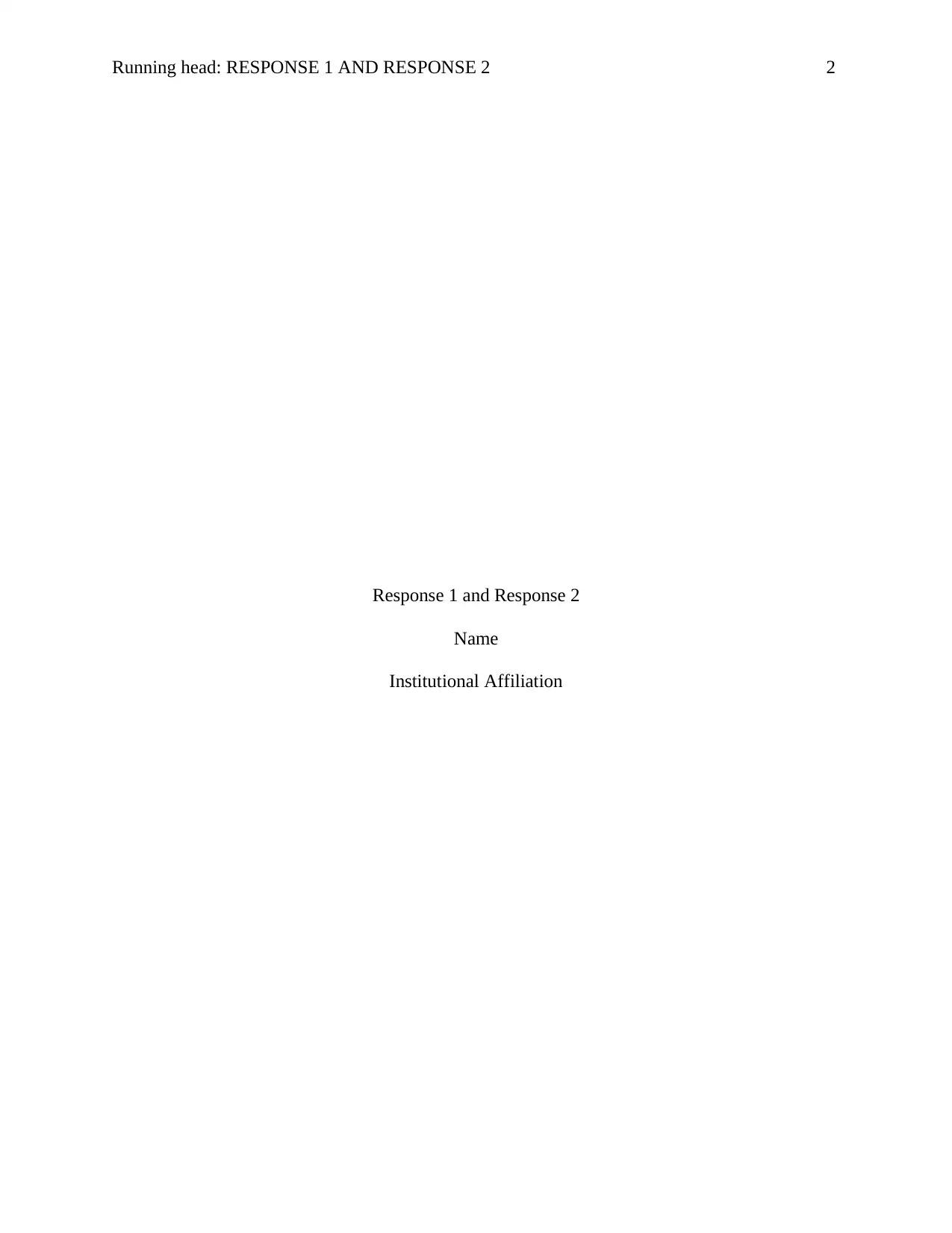
Running head: RESPONSE 1 AND RESPONSE 2 2
Response 1 and Response 2
Name
Institutional Affiliation
Response 1 and Response 2
Name
Institutional Affiliation
Paraphrase This Document
Need a fresh take? Get an instant paraphrase of this document with our AI Paraphraser
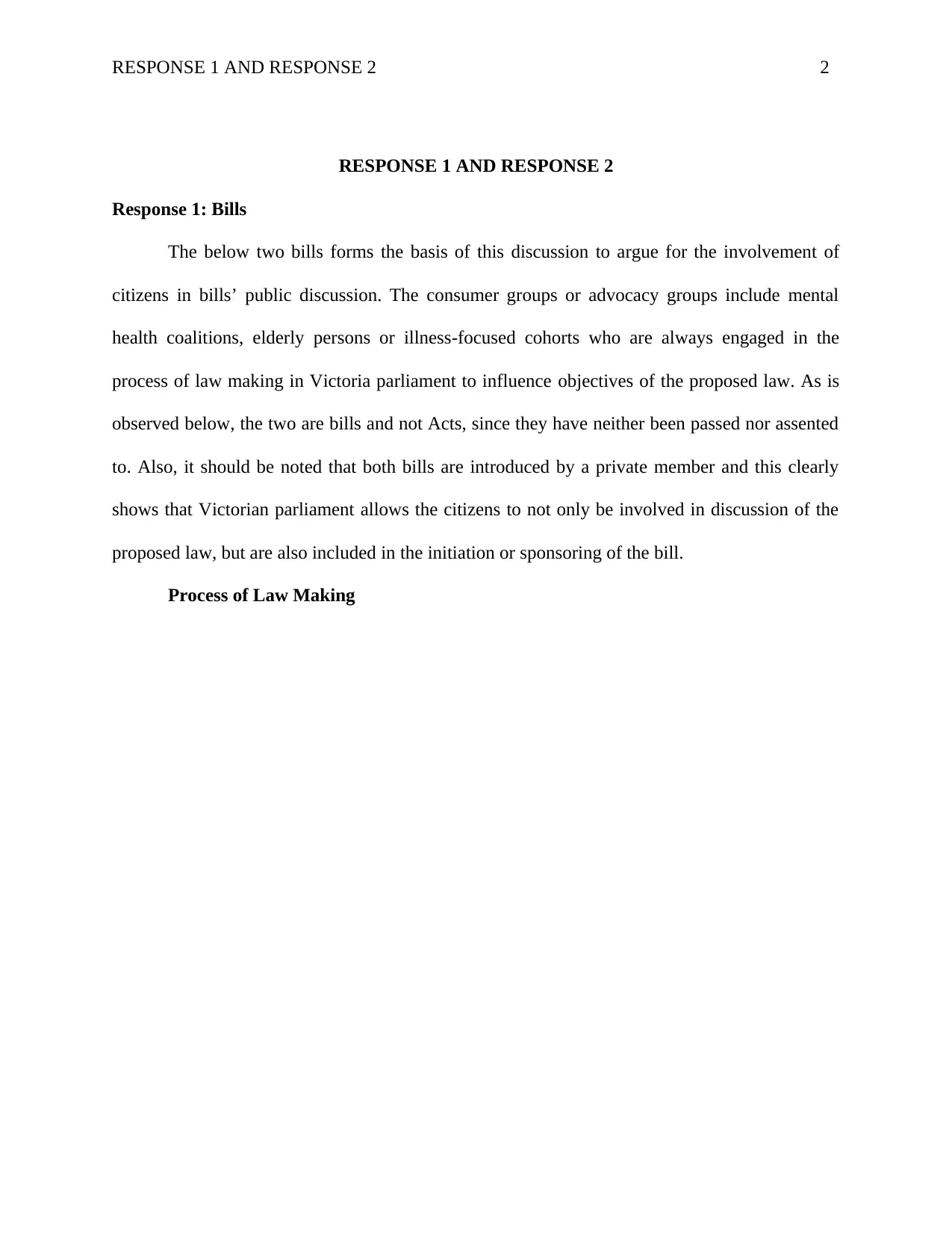
RESPONSE 1 AND RESPONSE 2 2
RESPONSE 1 AND RESPONSE 2
Response 1: Bills
The below two bills forms the basis of this discussion to argue for the involvement of
citizens in bills’ public discussion. The consumer groups or advocacy groups include mental
health coalitions, elderly persons or illness-focused cohorts who are always engaged in the
process of law making in Victoria parliament to influence objectives of the proposed law. As is
observed below, the two are bills and not Acts, since they have neither been passed nor assented
to. Also, it should be noted that both bills are introduced by a private member and this clearly
shows that Victorian parliament allows the citizens to not only be involved in discussion of the
proposed law, but are also included in the initiation or sponsoring of the bill.
Process of Law Making
RESPONSE 1 AND RESPONSE 2
Response 1: Bills
The below two bills forms the basis of this discussion to argue for the involvement of
citizens in bills’ public discussion. The consumer groups or advocacy groups include mental
health coalitions, elderly persons or illness-focused cohorts who are always engaged in the
process of law making in Victoria parliament to influence objectives of the proposed law. As is
observed below, the two are bills and not Acts, since they have neither been passed nor assented
to. Also, it should be noted that both bills are introduced by a private member and this clearly
shows that Victorian parliament allows the citizens to not only be involved in discussion of the
proposed law, but are also included in the initiation or sponsoring of the bill.
Process of Law Making
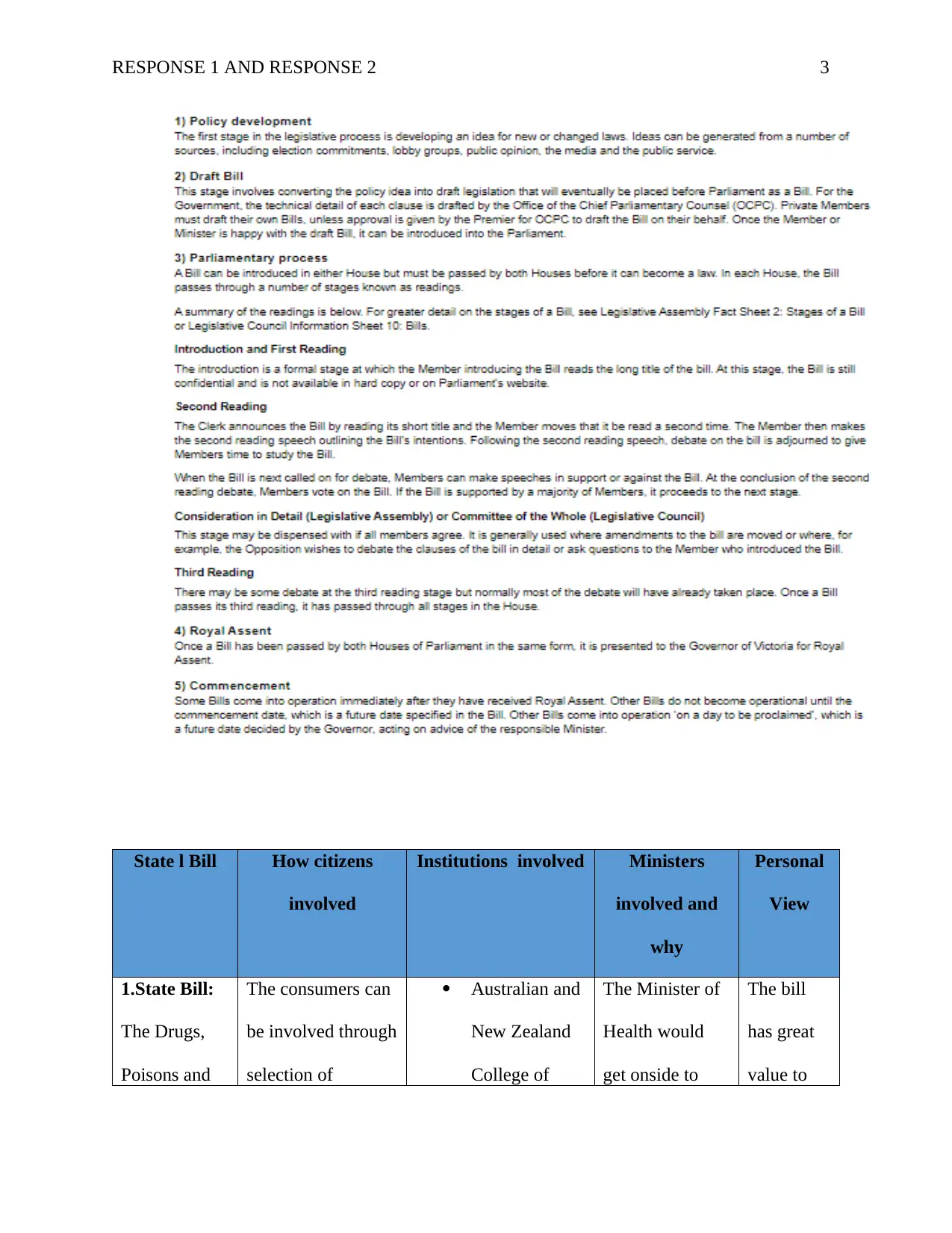
RESPONSE 1 AND RESPONSE 2 3
State l Bill How citizens
involved
Institutions involved Ministers
involved and
why
Personal
View
1.State Bill:
The Drugs,
Poisons and
The consumers can
be involved through
selection of
Australian and
New Zealand
College of
The Minister of
Health would
get onside to
The bill
has great
value to
State l Bill How citizens
involved
Institutions involved Ministers
involved and
why
Personal
View
1.State Bill:
The Drugs,
Poisons and
The consumers can
be involved through
selection of
Australian and
New Zealand
College of
The Minister of
Health would
get onside to
The bill
has great
value to
⊘ This is a preview!⊘
Do you want full access?
Subscribe today to unlock all pages.

Trusted by 1+ million students worldwide
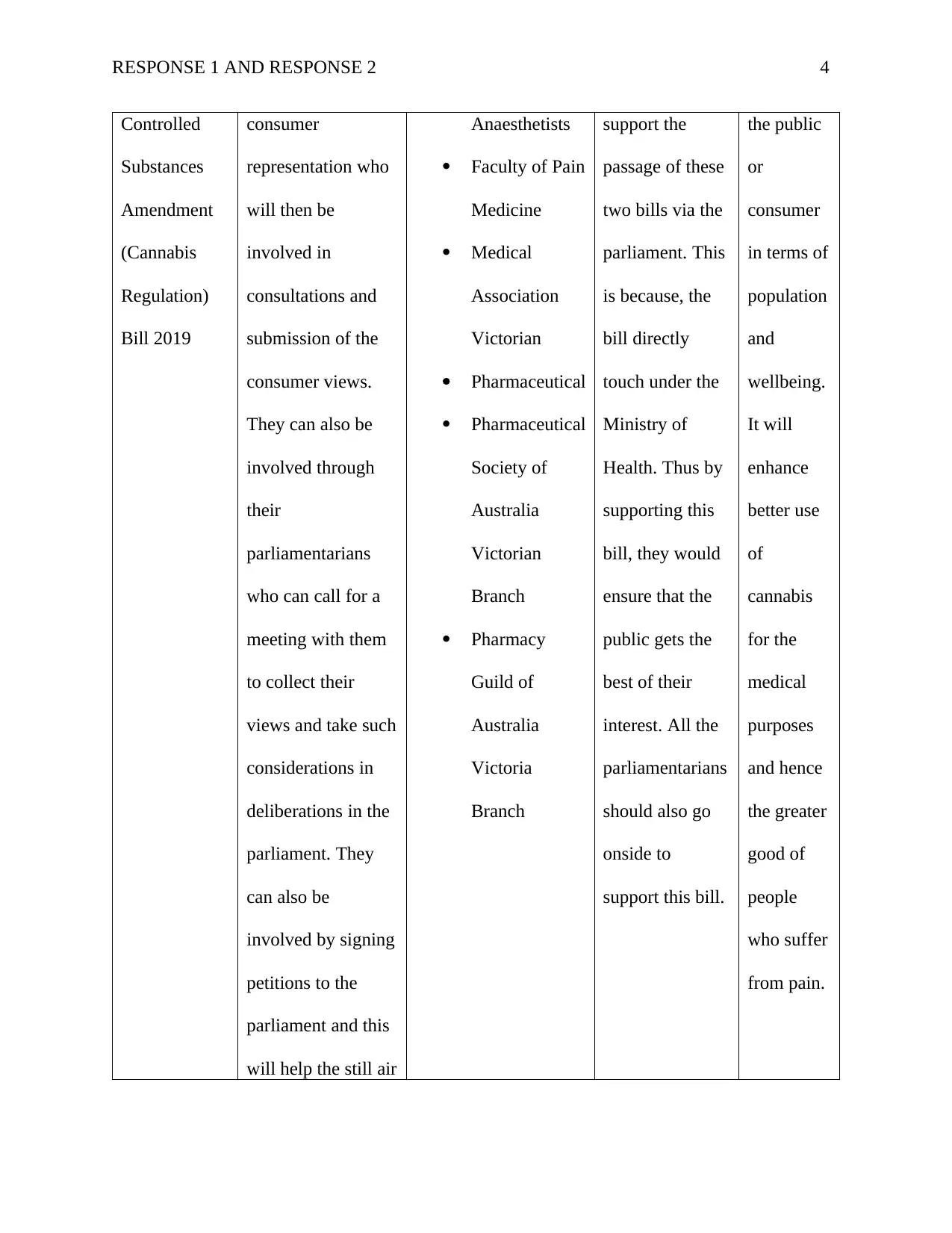
RESPONSE 1 AND RESPONSE 2 4
Controlled
Substances
Amendment
(Cannabis
Regulation)
Bill 2019
consumer
representation who
will then be
involved in
consultations and
submission of the
consumer views.
They can also be
involved through
their
parliamentarians
who can call for a
meeting with them
to collect their
views and take such
considerations in
deliberations in the
parliament. They
can also be
involved by signing
petitions to the
parliament and this
will help the still air
Anaesthetists
Faculty of Pain
Medicine
Medical
Association
Victorian
Pharmaceutical
Pharmaceutical
Society of
Australia
Victorian
Branch
Pharmacy
Guild of
Australia
Victoria
Branch
support the
passage of these
two bills via the
parliament. This
is because, the
bill directly
touch under the
Ministry of
Health. Thus by
supporting this
bill, they would
ensure that the
public gets the
best of their
interest. All the
parliamentarians
should also go
onside to
support this bill.
the public
or
consumer
in terms of
population
and
wellbeing.
It will
enhance
better use
of
cannabis
for the
medical
purposes
and hence
the greater
good of
people
who suffer
from pain.
Controlled
Substances
Amendment
(Cannabis
Regulation)
Bill 2019
consumer
representation who
will then be
involved in
consultations and
submission of the
consumer views.
They can also be
involved through
their
parliamentarians
who can call for a
meeting with them
to collect their
views and take such
considerations in
deliberations in the
parliament. They
can also be
involved by signing
petitions to the
parliament and this
will help the still air
Anaesthetists
Faculty of Pain
Medicine
Medical
Association
Victorian
Pharmaceutical
Pharmaceutical
Society of
Australia
Victorian
Branch
Pharmacy
Guild of
Australia
Victoria
Branch
support the
passage of these
two bills via the
parliament. This
is because, the
bill directly
touch under the
Ministry of
Health. Thus by
supporting this
bill, they would
ensure that the
public gets the
best of their
interest. All the
parliamentarians
should also go
onside to
support this bill.
the public
or
consumer
in terms of
population
and
wellbeing.
It will
enhance
better use
of
cannabis
for the
medical
purposes
and hence
the greater
good of
people
who suffer
from pain.
Paraphrase This Document
Need a fresh take? Get an instant paraphrase of this document with our AI Paraphraser
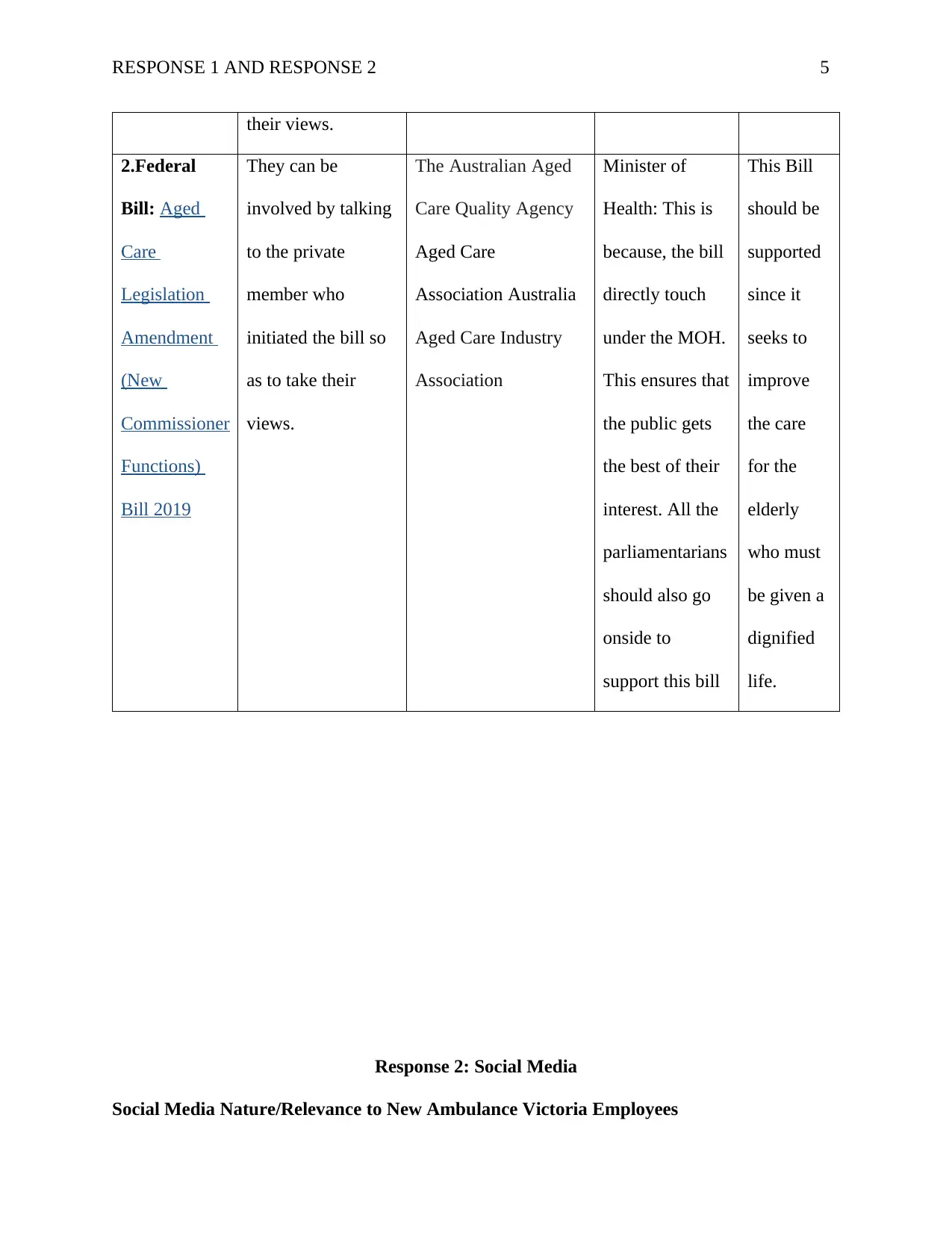
RESPONSE 1 AND RESPONSE 2 5
their views.
2.Federal
Bill: Aged
Care
Legislation
Amendment
(New
Commissioner
Functions)
Bill 2019
They can be
involved by talking
to the private
member who
initiated the bill so
as to take their
views.
The Australian Aged
Care Quality Agency
Aged Care
Association Australia
Aged Care Industry
Association
Minister of
Health: This is
because, the bill
directly touch
under the MOH.
This ensures that
the public gets
the best of their
interest. All the
parliamentarians
should also go
onside to
support this bill
This Bill
should be
supported
since it
seeks to
improve
the care
for the
elderly
who must
be given a
dignified
life.
Response 2: Social Media
Social Media Nature/Relevance to New Ambulance Victoria Employees
their views.
2.Federal
Bill: Aged
Care
Legislation
Amendment
(New
Commissioner
Functions)
Bill 2019
They can be
involved by talking
to the private
member who
initiated the bill so
as to take their
views.
The Australian Aged
Care Quality Agency
Aged Care
Association Australia
Aged Care Industry
Association
Minister of
Health: This is
because, the bill
directly touch
under the MOH.
This ensures that
the public gets
the best of their
interest. All the
parliamentarians
should also go
onside to
support this bill
This Bill
should be
supported
since it
seeks to
improve
the care
for the
elderly
who must
be given a
dignified
life.
Response 2: Social Media
Social Media Nature/Relevance to New Ambulance Victoria Employees
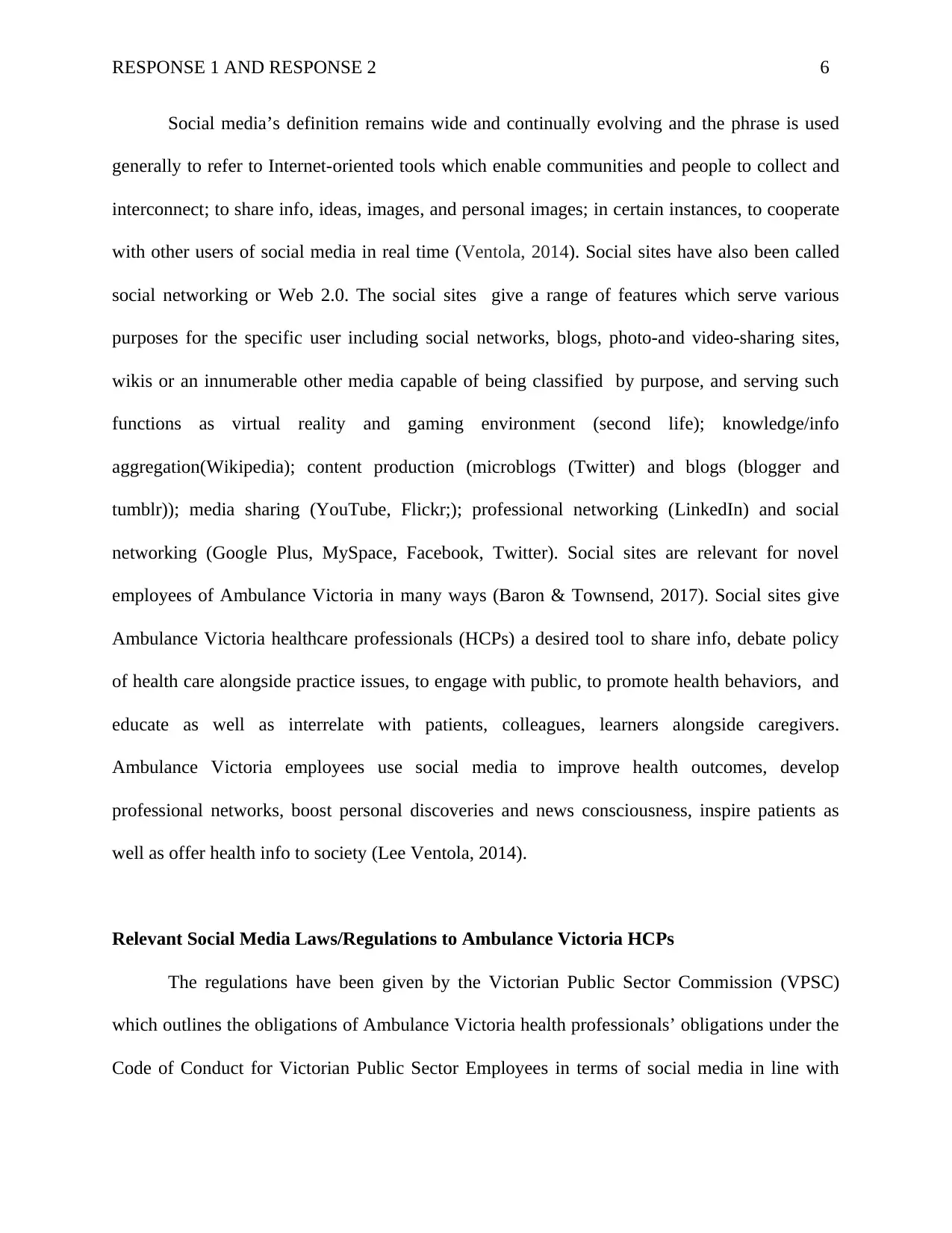
RESPONSE 1 AND RESPONSE 2 6
Social media’s definition remains wide and continually evolving and the phrase is used
generally to refer to Internet-oriented tools which enable communities and people to collect and
interconnect; to share info, ideas, images, and personal images; in certain instances, to cooperate
with other users of social media in real time (Ventola, 2014). Social sites have also been called
social networking or Web 2.0. The social sites give a range of features which serve various
purposes for the specific user including social networks, blogs, photo-and video-sharing sites,
wikis or an innumerable other media capable of being classified by purpose, and serving such
functions as virtual reality and gaming environment (second life); knowledge/info
aggregation(Wikipedia); content production (microblogs (Twitter) and blogs (blogger and
tumblr)); media sharing (YouTube, Flickr;); professional networking (LinkedIn) and social
networking (Google Plus, MySpace, Facebook, Twitter). Social sites are relevant for novel
employees of Ambulance Victoria in many ways (Baron & Townsend, 2017). Social sites give
Ambulance Victoria healthcare professionals (HCPs) a desired tool to share info, debate policy
of health care alongside practice issues, to engage with public, to promote health behaviors, and
educate as well as interrelate with patients, colleagues, learners alongside caregivers.
Ambulance Victoria employees use social media to improve health outcomes, develop
professional networks, boost personal discoveries and news consciousness, inspire patients as
well as offer health info to society (Lee Ventola, 2014).
Relevant Social Media Laws/Regulations to Ambulance Victoria HCPs
The regulations have been given by the Victorian Public Sector Commission (VPSC)
which outlines the obligations of Ambulance Victoria health professionals’ obligations under the
Code of Conduct for Victorian Public Sector Employees in terms of social media in line with
Social media’s definition remains wide and continually evolving and the phrase is used
generally to refer to Internet-oriented tools which enable communities and people to collect and
interconnect; to share info, ideas, images, and personal images; in certain instances, to cooperate
with other users of social media in real time (Ventola, 2014). Social sites have also been called
social networking or Web 2.0. The social sites give a range of features which serve various
purposes for the specific user including social networks, blogs, photo-and video-sharing sites,
wikis or an innumerable other media capable of being classified by purpose, and serving such
functions as virtual reality and gaming environment (second life); knowledge/info
aggregation(Wikipedia); content production (microblogs (Twitter) and blogs (blogger and
tumblr)); media sharing (YouTube, Flickr;); professional networking (LinkedIn) and social
networking (Google Plus, MySpace, Facebook, Twitter). Social sites are relevant for novel
employees of Ambulance Victoria in many ways (Baron & Townsend, 2017). Social sites give
Ambulance Victoria healthcare professionals (HCPs) a desired tool to share info, debate policy
of health care alongside practice issues, to engage with public, to promote health behaviors, and
educate as well as interrelate with patients, colleagues, learners alongside caregivers.
Ambulance Victoria employees use social media to improve health outcomes, develop
professional networks, boost personal discoveries and news consciousness, inspire patients as
well as offer health info to society (Lee Ventola, 2014).
Relevant Social Media Laws/Regulations to Ambulance Victoria HCPs
The regulations have been given by the Victorian Public Sector Commission (VPSC)
which outlines the obligations of Ambulance Victoria health professionals’ obligations under the
Code of Conduct for Victorian Public Sector Employees in terms of social media in line with
⊘ This is a preview!⊘
Do you want full access?
Subscribe today to unlock all pages.

Trusted by 1+ million students worldwide
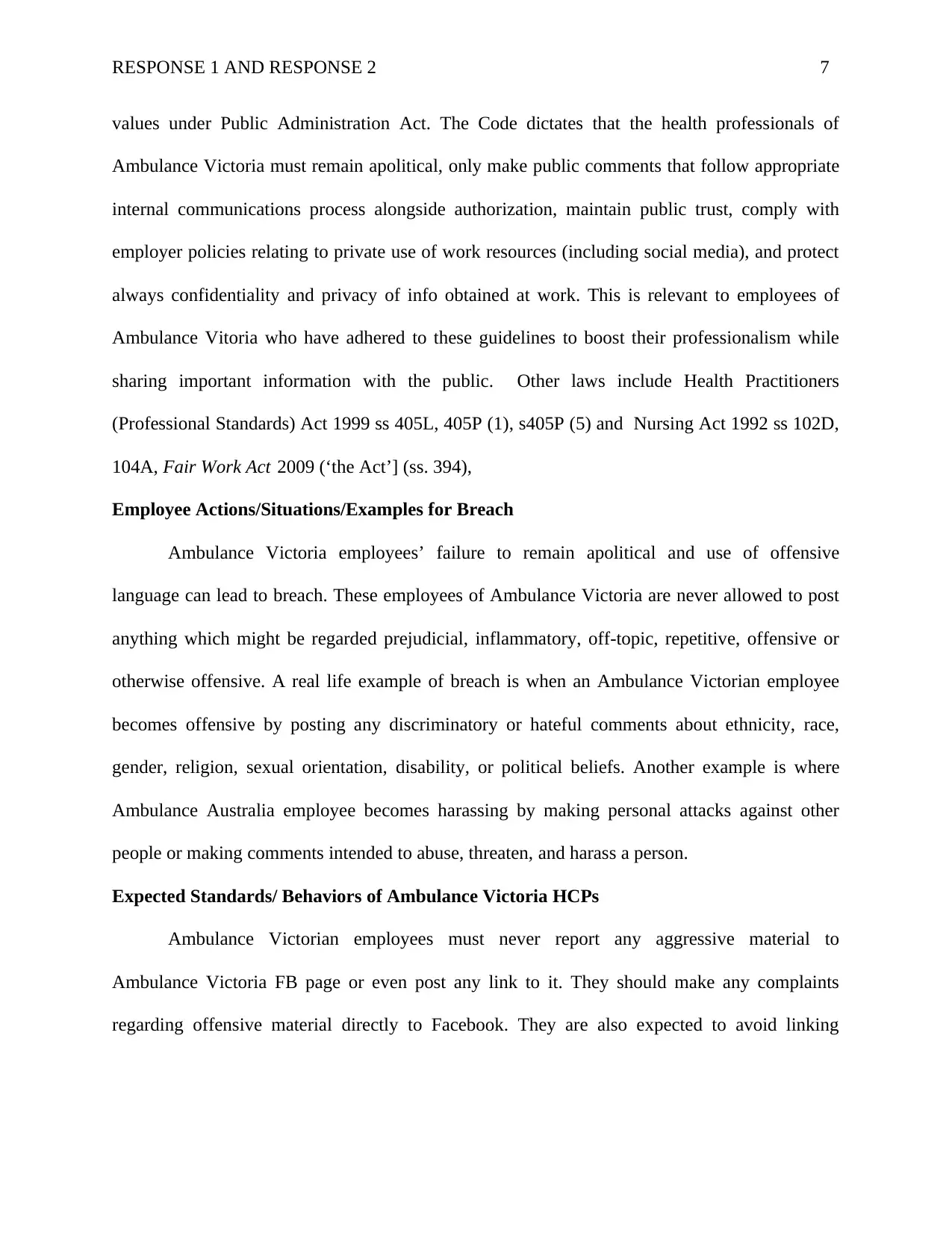
RESPONSE 1 AND RESPONSE 2 7
values under Public Administration Act. The Code dictates that the health professionals of
Ambulance Victoria must remain apolitical, only make public comments that follow appropriate
internal communications process alongside authorization, maintain public trust, comply with
employer policies relating to private use of work resources (including social media), and protect
always confidentiality and privacy of info obtained at work. This is relevant to employees of
Ambulance Vitoria who have adhered to these guidelines to boost their professionalism while
sharing important information with the public. Other laws include Health Practitioners
(Professional Standards) Act 1999 ss 405L, 405P (1), s405P (5) and Nursing Act 1992 ss 102D,
104A, Fair Work Act 2009 (‘the Act’] (ss. 394),
Employee Actions/Situations/Examples for Breach
Ambulance Victoria employees’ failure to remain apolitical and use of offensive
language can lead to breach. These employees of Ambulance Victoria are never allowed to post
anything which might be regarded prejudicial, inflammatory, off-topic, repetitive, offensive or
otherwise offensive. A real life example of breach is when an Ambulance Victorian employee
becomes offensive by posting any discriminatory or hateful comments about ethnicity, race,
gender, religion, sexual orientation, disability, or political beliefs. Another example is where
Ambulance Australia employee becomes harassing by making personal attacks against other
people or making comments intended to abuse, threaten, and harass a person.
Expected Standards/ Behaviors of Ambulance Victoria HCPs
Ambulance Victorian employees must never report any aggressive material to
Ambulance Victoria FB page or even post any link to it. They should make any complaints
regarding offensive material directly to Facebook. They are also expected to avoid linking
values under Public Administration Act. The Code dictates that the health professionals of
Ambulance Victoria must remain apolitical, only make public comments that follow appropriate
internal communications process alongside authorization, maintain public trust, comply with
employer policies relating to private use of work resources (including social media), and protect
always confidentiality and privacy of info obtained at work. This is relevant to employees of
Ambulance Vitoria who have adhered to these guidelines to boost their professionalism while
sharing important information with the public. Other laws include Health Practitioners
(Professional Standards) Act 1999 ss 405L, 405P (1), s405P (5) and Nursing Act 1992 ss 102D,
104A, Fair Work Act 2009 (‘the Act’] (ss. 394),
Employee Actions/Situations/Examples for Breach
Ambulance Victoria employees’ failure to remain apolitical and use of offensive
language can lead to breach. These employees of Ambulance Victoria are never allowed to post
anything which might be regarded prejudicial, inflammatory, off-topic, repetitive, offensive or
otherwise offensive. A real life example of breach is when an Ambulance Victorian employee
becomes offensive by posting any discriminatory or hateful comments about ethnicity, race,
gender, religion, sexual orientation, disability, or political beliefs. Another example is where
Ambulance Australia employee becomes harassing by making personal attacks against other
people or making comments intended to abuse, threaten, and harass a person.
Expected Standards/ Behaviors of Ambulance Victoria HCPs
Ambulance Victorian employees must never report any aggressive material to
Ambulance Victoria FB page or even post any link to it. They should make any complaints
regarding offensive material directly to Facebook. They are also expected to avoid linking
Paraphrase This Document
Need a fresh take? Get an instant paraphrase of this document with our AI Paraphraser
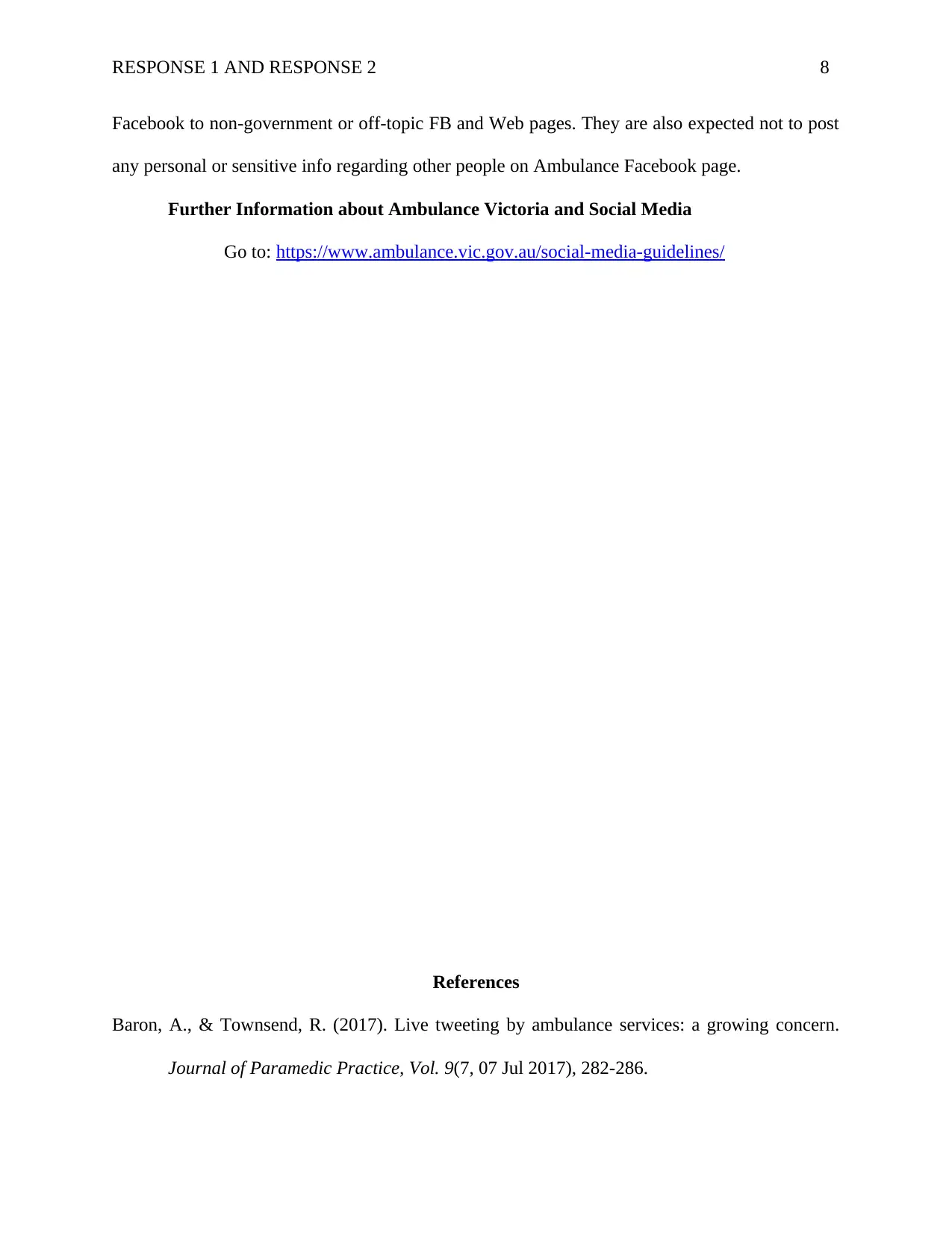
RESPONSE 1 AND RESPONSE 2 8
Facebook to non-government or off-topic FB and Web pages. They are also expected not to post
any personal or sensitive info regarding other people on Ambulance Facebook page.
Further Information about Ambulance Victoria and Social Media
Go to: https://www.ambulance.vic.gov.au/social-media-guidelines/
References
Baron, A., & Townsend, R. (2017). Live tweeting by ambulance services: a growing concern.
Journal of Paramedic Practice, Vol. 9(7, 07 Jul 2017), 282-286.
Facebook to non-government or off-topic FB and Web pages. They are also expected not to post
any personal or sensitive info regarding other people on Ambulance Facebook page.
Further Information about Ambulance Victoria and Social Media
Go to: https://www.ambulance.vic.gov.au/social-media-guidelines/
References
Baron, A., & Townsend, R. (2017). Live tweeting by ambulance services: a growing concern.
Journal of Paramedic Practice, Vol. 9(7, 07 Jul 2017), 282-286.
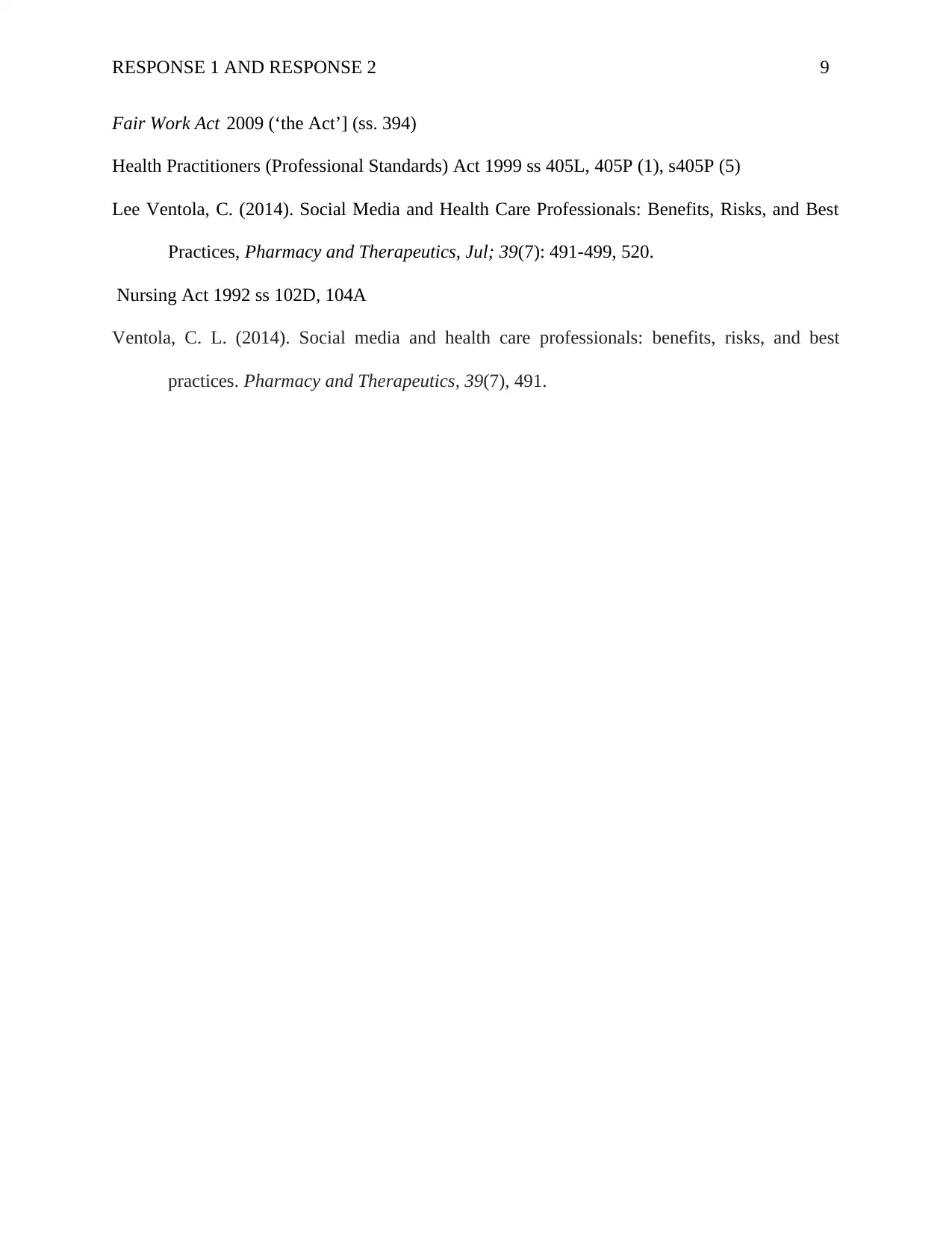
RESPONSE 1 AND RESPONSE 2 9
Fair Work Act 2009 (‘the Act’] (ss. 394)
Health Practitioners (Professional Standards) Act 1999 ss 405L, 405P (1), s405P (5)
Lee Ventola, C. (2014). Social Media and Health Care Professionals: Benefits, Risks, and Best
Practices, Pharmacy and Therapeutics, Jul; 39(7): 491-499, 520.
Nursing Act 1992 ss 102D, 104A
Ventola, C. L. (2014). Social media and health care professionals: benefits, risks, and best
practices. Pharmacy and Therapeutics, 39(7), 491.
Fair Work Act 2009 (‘the Act’] (ss. 394)
Health Practitioners (Professional Standards) Act 1999 ss 405L, 405P (1), s405P (5)
Lee Ventola, C. (2014). Social Media and Health Care Professionals: Benefits, Risks, and Best
Practices, Pharmacy and Therapeutics, Jul; 39(7): 491-499, 520.
Nursing Act 1992 ss 102D, 104A
Ventola, C. L. (2014). Social media and health care professionals: benefits, risks, and best
practices. Pharmacy and Therapeutics, 39(7), 491.
⊘ This is a preview!⊘
Do you want full access?
Subscribe today to unlock all pages.

Trusted by 1+ million students worldwide
1 out of 9
Your All-in-One AI-Powered Toolkit for Academic Success.
+13062052269
info@desklib.com
Available 24*7 on WhatsApp / Email
![[object Object]](/_next/static/media/star-bottom.7253800d.svg)
Unlock your academic potential
Copyright © 2020–2026 A2Z Services. All Rights Reserved. Developed and managed by ZUCOL.

